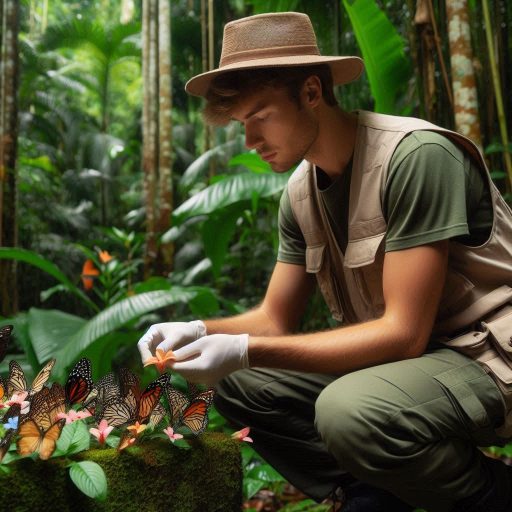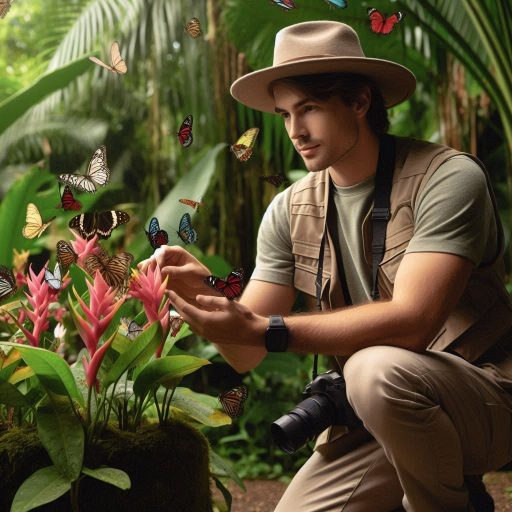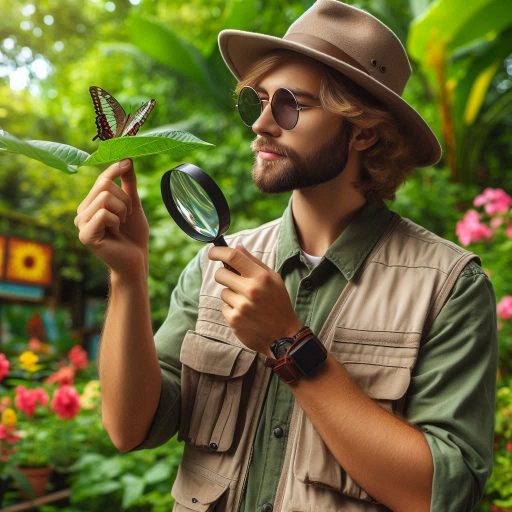Introduction
Zoologists study animals and their behaviors in various environments.
They research wildlife to understand ecosystems and promote conservation.
Their work often involves field studies, laboratory research, and data analysis.
They may also educate the public about wildlife and conservation efforts.
Key skills and qualities are essential for success in this field.
Strong observation skills enable zoologists to notice subtle behaviors in animals.
Physical fitness helps them conduct fieldwork in diverse and challenging terrains.
Additionally, effective communication skills allow zoologists to share research findings with colleagues and the public.
A passion for animals drives zoologists to work tirelessly for wildlife conservation.
They often face setbacks but remain dedicated to long-term goals.
Patience and perseverance are vital in overcoming challenges in research.
Furthermore, ethical and professional behavior ensures the humane treatment of animals.
Adhering to ethical guidelines fosters trust in the scientific community and the public.
Zoologists play a crucial role in understanding and protecting wildlife.
Their key skills and qualities contribute significantly to their success and impact in the field.
Education and Training
Degree in Biology, Zoology, or Related Field
A solid educational foundation is crucial for aspiring zoologists.
Most zoologists earn a bachelor’s degree in biology, zoology, or a related field.
This degree provides essential knowledge about animal biology, ecology, and behavior.
Many universities offer specialized programs focused on wildlife biology or conservation.
Advanced degrees, such as a master’s or Ph.D., can further enhance career prospects.
Graduate studies allow zoologists to specialize in specific areas, such as marine biology or wildlife management.
Research projects during these programs often contribute to significant advancements in the field.
In addition to coursework, zoology programs typically include laboratory work.
This hands-on training helps students develop practical skills necessary for fieldwork.
Learning about animal anatomy, physiology, and genetics is critical for understanding species and their environments.
Zoologists also need to understand various scientific methods.
These include data collection techniques, statistical analysis, and research design.
Strong analytical skills enable zoologists to interpret data and draw meaningful conclusions.
Hands-on Experience Through Internships and Research Opportunities
Hands-on experience is vital for building a successful career in zoology.
Internships provide invaluable opportunities to gain practical skills and apply theoretical knowledge.
Many universities and organizations offer internships at zoos, wildlife reserves, and research institutions.
During internships, students can observe professionals in action and participate in fieldwork.
They learn to collect data, track animal behavior, and assist in conservation efforts.
This experience helps students understand the day-to-day responsibilities of a zoologist.
Research opportunities also play a significant role in skill development.
Many students engage in research projects during their academic programs.
These projects often focus on specific animal species or ecosystems.
Conducting research enhances critical thinking and problem-solving skills.
Students who publish their findings gain recognition in the scientific community.
This exposure can open doors to job opportunities and advanced study programs.
Networking is another benefit of internships and research experiences.
Students often connect with professionals in the field, leading to mentorship opportunities.
These connections can provide guidance and support throughout their careers.
Zoologists must stay current with advancements in their field.
Continuing education and professional development are crucial for success.
Attending workshops, conferences, and seminars helps zoologists expand their knowledge.
Education and training are essential for aspiring zoologists.
A degree in biology or zoology provides the foundational knowledge needed for the field.
Hands-on experience through internships and research opportunities further develops practical skills.
These elements together equip zoologists to succeed in their careers and contribute to wildlife conservation.
Strong observation skills
Ability to Notice and Interpret Animal Behavior
Strong observation skills are essential for zoologists.
They must notice subtle changes in animal behavior.
By carefully observing, they can identify patterns and social dynamics within species.
This ability helps zoologists understand how animals interact with their environments and each other.
For example, observing mating rituals can reveal important information about reproductive success.
Understanding these behaviors aids in developing effective conservation strategies.
Monitoring feeding habits also provides insights into dietary needs and preferences.
Zoologists use their observation skills to track changes in animal behavior over time.
They look for responses to environmental factors, such as climate change or habitat loss.
Identifying these changes can signal potential threats to species survival.
Fieldwork requires keen observation skills, especially in natural habitats.
Zoologists often work in challenging conditions, requiring focus and patience.
They must blend into their surroundings to minimize disturbances to wildlife.
Documenting animal behavior is crucial for research and conservation efforts.
Zoologists take detailed notes and record observations systematically.
These records form the basis of their analysis and conclusions.
Attention to Detail in Data Collection and Analysis
Attention to detail is equally important in data collection and analysis.
Accurate data collection is vital for any scientific study.
Zoologists must carefully gather information to ensure its reliability.
They use various methods, such as direct observation and tracking devices, to collect data.
During field studies, zoologists monitor various parameters, including population counts and habitat conditions.
They pay close attention to specific details that may influence their findings.
For example, noting the presence of predators can impact prey behavior.
Data analysis involves interpreting collected information to draw meaningful conclusions.
Zoologists often use statistical tools to analyze trends and patterns.
Their attention to detail ensures they accurately represent the data.
This accuracy enhances the credibility of their research.
Effective data analysis helps zoologists make informed recommendations.
They may suggest conservation strategies based on their findings.
Strong analytical skills allow them to communicate results effectively to stakeholders.
In addition, meticulous data documentation is essential for replicability.
Other researchers must verify findings to build on previous work.
A well-documented study allows others to reproduce experiments or analyze data independently.
Training in data collection and analysis enhances these skills.
Zoologists often participate in workshops and training sessions to improve their techniques.
Learning from experienced professionals helps them refine their observational abilities.
Strong observation skills are vital for zoologists.
The ability to notice and interpret animal behavior informs their research.
Attention to detail in data collection and analysis ensures accuracy and reliability.
Together, these skills equip zoologists to contribute significantly to wildlife conservation and understanding animal behavior.
Read: Exploring the Different Branches of Geology
Passion for animals
Genuine Interest in Wildlife Conservation and Animal Welfare
A genuine passion for animals drives successful zoologists.
Their love for wildlife fuels their desire to study and protect species.
This passion motivates them to pursue careers focused on conservation and animal welfare.
Zoologists often begin their journeys with childhood experiences in nature.
Many develop strong connections with animals during their formative years.
These connections inspire them to understand animal behavior and habitats.
A deep appreciation for wildlife encourages zoologists to engage in research and education.
Zoologists actively promote wildlife conservation efforts.
They participate in initiatives aimed at protecting endangered species.
Their passion compels them to advocate for better living conditions for animals in captivity.
By understanding animal needs, they work to improve their welfare.
Their commitment to animal welfare extends beyond research.
Many zoologists volunteer with local animal shelters or wildlife rehabilitation centers.
This hands-on experience enhances their understanding of animal care and welfare.
It also deepens their emotional connection with the species they study.
Dedication to Making a Positive Impact on Animal Populations
Zoologists dedicate their careers to making a positive impact on animal populations.
They recognize the urgent need to address declining species and habitat loss.
Their passion drives them to develop and implement effective conservation strategies.
By studying animal populations, zoologists gather vital data on their status and threats.
This information allows them to identify conservation priorities.
They collaborate with conservation organizations to create action plans that support vulnerable species.
Their dedication extends to educating the public about conservation issues.
Zoologists engage in outreach programs to raise awareness about wildlife protection.
They inspire communities to take action and support conservation efforts.
Their enthusiasm for wildlife often resonates with others, creating a ripple effect.
Additionally, zoologists participate in community projects focused on habitat restoration.
They understand that protecting animal populations requires restoring ecosystems.
Their hands-on involvement in these projects reflects their commitment to creating a positive impact.
Zoologists also contribute to policy discussions that affect wildlife conservation.
They advocate for regulations that protect endangered species and their habitats.
Their passion for animals drives them to influence legislation for positive change.
A passion for animals is fundamental to the work of zoologists.
Their genuine interest in wildlife conservation and animal welfare motivates their research and advocacy.
This dedication enables them to make significant contributions to protecting animal populations.
Through their efforts, zoologists foster a deeper understanding of the importance of wildlife conservation.
Their commitment inspires future generations to value and protect our planet‘s diverse ecosystems.
Read: Top Skills Needed for a Successful Geology Career
Physical fitness
Ability to Work in Outdoor Environments and Sometimes Rough Terrain
Physical fitness is crucial for successful zoologists.
They often work in outdoor environments that require agility and endurance.
Fieldwork frequently takes them to remote locations, where access can be challenging.
Zoologists must navigate through dense forests, rocky terrains, or wetlands.
Working in these conditions demands strength and coordination.
They often carry equipment, such as binoculars, cameras, and data collection tools.
This equipment can be heavy, requiring physical stamina and resilience.
Zoologists may also traverse uneven ground while tracking animals or setting up research sites.
Exposure to diverse environments enhances their adaptability.
They learn to work effectively in varying weather conditions.
Whether it‘s extreme heat, rain, or cold, they must remain focused on their tasks.
Physical fitness enables zoologists to withstand these conditions without compromising their research.
In addition, fieldwork often involves climbing, hiking, or wading through water.
These activities challenge their physical limits and require robust cardiovascular health.
Staying in good shape allows zoologists to perform their duties effectively and safely.
Stamina for Long Hours of Observation and Fieldwork
Zoologists frequently engage in long hours of observation during field studies.
They may spend entire days watching animal behavior without interruption.
This requires significant stamina and mental focus.
Physical fitness supports their ability to remain attentive and alert throughout these lengthy sessions.
Extended periods of inactivity can lead to discomfort.
Being physically fit helps zoologists manage fatigue and maintain concentration.
They learn to employ techniques to stay comfortable while observing wildlife.
This might include finding stable positions and remaining quiet to avoid disturbing animals.
Fieldwork often includes early mornings and late evenings.
Many animals are most active during these times, requiring zoologists to adjust their schedules.
Their physical fitness allows them to adapt to these irregular hours without compromising their health.
Zoologists also engage in data collection, which may involve setting up traps or camera equipment.
These tasks can be physically demanding, requiring strength and coordination.
A good level of physical fitness allows them to complete these tasks efficiently.
Moreover, maintaining physical fitness can enhance teamwork.
Zoologists often collaborate with other researchers during field studies.
Their ability to contribute physically strengthens group dynamics and ensures the success of projects.
Physical fitness is vital for zoologists in various ways.
The ability to work in outdoor environments and rough terrain is essential for fieldwork.
Stamina for long hours of observation and data collection further enhances their effectiveness.
By maintaining their physical health, zoologists can fulfill their roles in wildlife research and conservation successfully.
This commitment to fitness ultimately supports their passion for animals and their dedication to protecting wildlife.
Read: The Future of Botany: Emerging Fields and Innovations

Communication skills
Ability to Work Well with Team Members and Collaborators
Strong communication skills are essential for zoologists.
They often work in teams with other professionals, including veterinarians and ecologists.
Clear communication fosters collaboration and ensures project success.
Zoologists must express their ideas and research findings effectively.
They engage in discussions to develop research plans and strategies.
Active listening is crucial for effective teamwork.
Zoologists must understand their colleagues‘ perspectives and insights.
This understanding enhances problem-solving and encourages innovative solutions.
Team meetings often involve sharing progress updates and discussing challenges.
Zoologists contribute their observations and insights to help guide the group‘s efforts.
Communication extends beyond verbal interactions.
Zoologists often create reports and presentations to share their findings.
Clear and organized documentation is vital for successful collaboration.
It allows team members to review data and contribute feedback.
Additionally, building strong relationships within teams enhances morale and productivity.
Positive interactions foster a supportive environment, encouraging collaboration.
When team members feel valued, they are more likely to contribute their best efforts.
Zoologists may also participate in interdisciplinary projects.
These collaborations require effective communication across diverse fields.
Understanding jargon and concepts from various disciplines is essential for success.
Strong communication skills help bridge gaps and ensure everyone is on the same page.
Clear and Effective Communication with the Public Through Writing and Speaking
Zoologists must also communicate effectively with the public.
Their research often impacts wildlife conservation, making public engagement vital.
Clear communication helps raise awareness about important issues.
Zoologists participate in outreach programs, educating communities about wildlife and conservation efforts.
Writing plays a significant role in a zoologist‘s career.
They write articles, reports, and publications to share their research.
Clarity and precision in writing ensure that their findings are accessible to a broader audience.
Effective writing allows them to influence public opinion and policy decisions.
Zoologists often present their research at conferences and workshops.
Speaking clearly and confidently is crucial during these presentations.
Engaging the audience keeps them interested in the topic.
Visual aids, such as slides and videos, enhance understanding.
Public engagement often includes responding to questions and feedback.
Zoologists must communicate complex information in an understandable way.
They tailor their messaging to suit different audiences, from students to policymakers.
This adaptability helps build strong connections with the community.
Moreover, social media has become an important tool for communication.
Zoologists use platforms to share their research and wildlife stories.
These platforms allow them to reach a larger audience quickly.
Engaging with followers helps raise awareness about conservation issues and inspires action.
Communication skills are vital for zoologists.
The ability to work well with team members enhances collaboration and project success.
Clear communication with the public through writing and speaking amplifies their impact on wildlife conservation.
By developing these skills, zoologists contribute significantly to understanding and protecting our natural world.
Read: What Does a Geologist Do? Career Overview and Insights
Problem-solving skills
Critical Thinking to Analyze Complex Data and Research Findings
Problem-solving skills are essential for zoologists.
They frequently face complex challenges in wildlife conservation and research.
Critical thinking allows them to analyze data effectively and draw meaningful conclusions.
Zoologists must assess information from various sources to make informed decisions.
When studying animal behavior, they gather extensive data.
This data can include population dynamics, habitat conditions, and environmental factors.
Analyzing these variables requires a keen analytical mind.
Zoologists look for patterns and correlations to understand ecological relationships.
They often use statistical software to process large datasets.
This technology aids in interpreting results and identifying trends.
By applying statistical methods, they can validate their findings and enhance the accuracy of their research.
Zoologists also need to consider the implications of their findings.
They evaluate how their research contributes to conservation efforts.
This assessment helps them prioritize actions based on urgency and impact.
Moreover, they must navigate the uncertainties inherent in scientific research.
Understanding that data may not always provide clear answers is essential.
Zoologists develop hypotheses based on available evidence and test them rigorously.
This iterative process refines their understanding of complex ecological systems.
Creativity in Developing Innovative Solutions to Conservation Challenges
In addition to critical thinking, creativity plays a vital role in problem-solving.
Zoologists often encounter unique conservation challenges that require innovative solutions.
They must think outside the box to address these issues effectively.
For example, habitat loss poses significant threats to many species.
Zoologists develop creative strategies to restore and protect habitats.
This may involve designing wildlife corridors or creating artificial nesting sites.
Such solutions often require collaboration with various stakeholders.
Zoologists also engage in public education campaigns to raise awareness.
They creatively communicate the importance of conservation efforts to diverse audiences.
Using engaging visuals and interactive experiences can enhance public understanding.
Furthermore, technological advancements provide new tools for conservation.
Zoologists utilize drones, camera traps, and tracking devices in their research.
These technologies allow them to monitor wildlife more efficiently.
Adapting to new technologies demonstrates their willingness to embrace change.
Problem-solving often requires collaboration with other experts.
Zoologists work alongside ecologists, conservation biologists, and policymakers.
Together, they brainstorm innovative solutions to complex challenges.
This interdisciplinary approach fosters creativity and enhances problem-solving capacity.
Zoologists also learn from failures and setbacks.
They view challenges as opportunities for growth and improvement.
Analyzing what went wrong helps them refine their approaches and strategies.
This resilience is key to overcoming obstacles in their work.
Problem-solving skills are fundamental to a zoologist‘s success.
Critical thinking enables them to analyze complex data and research findings effectively.
Creativity helps them develop innovative solutions to conservation challenges.
By honing these skills, zoologists can make significant contributions to wildlife conservation and management.
Their ability to navigate complexity and think creatively is crucial for protecting our planet’s biodiversity.
Uncover the Details: What Does an Optometrist Do? Career Overview and Duties
Patience and perseverance
Willingness to Wait for Results and Endure Setbacks
Patience and perseverance are essential traits for zoologists.
Wildlife research often takes time and yields slow results.
Zoologists must wait for data to accumulate before drawing conclusions.
Long-term studies can span several years, requiring sustained commitment.
Setbacks are common in the field of zoology.
Research projects may not unfold as planned, leading to frustration.
For example, weather conditions can delay fieldwork or disrupt data collection.
Wildlife behavior can also be unpredictable, affecting research outcomes.
Zoologists must maintain a positive outlook during these challenges.
Learning to cope with setbacks strengthens their resolve.
They view obstacles as opportunities to learn and adapt.
Each failure provides valuable insights that contribute to future success.
Zoologists develop strategies to overcome challenges and improve their methods.
Their ability to remain patient in the face of adversity fosters resilience.
This resilience is crucial when working with endangered species.
Protecting vulnerable populations requires ongoing effort and dedication.
Zoologists often invest years in their projects to achieve meaningful outcomes.
Commitment to Long-Term Projects and Goals for Wildlife Preservation
Zoologists often commit to long-term projects focused on wildlife preservation.
They recognize that meaningful change takes time and effort.
Building relationships with communities and stakeholders is vital for success.
Long-term monitoring of species populations is essential.
Zoologists track changes in numbers, health, and behavior over time.
This data helps them understand trends and identify conservation needs.
They use this information to develop targeted strategies for protection.
Additionally, they often participate in habitat restoration initiatives.
These projects require extensive planning and execution over several years.
Zoologists must engage with local communities to ensure success.
This collaboration fosters trust and encourages sustainable practices.
Their dedication to long-term goals can inspire others.
By demonstrating the importance of wildlife conservation, they engage public support.
Educational outreach enhances community involvement in preservation efforts.
Moreover, perseverance is critical when advocating for policy changes.
Zoologists often work with government agencies to promote conservation legislation.
These efforts can be slow and require continued advocacy.
They must remain steadfast in their commitment to influence change.
Zoologists also share their findings with the scientific community.
Publishing research can take time, but it is crucial for knowledge dissemination.
Their work contributes to the broader understanding of biodiversity and conservation.
Patience and perseverance are vital traits for zoologists.
The willingness to wait for results and endure setbacks is essential for success.
Their commitment to long-term projects and wildlife preservation drives meaningful change.
By cultivating these qualities, zoologists significantly impact the conservation of species and ecosystems.
Their dedication inspires future generations to prioritize wildlife protection and sustainability.
Transform Your Career Today
Unlock a personalized career strategy that drives real results. Get tailored advice and a roadmap designed just for you.
Start NowDiscover More: Ethical Considerations in Virology Research
Learn More: Marine Biology Internship Opportunities
Ethical and professional behavior
Adherence to Ethical Guidelines in Animal Research and Handling
Ethical and professional behavior is crucial for zoologists.
They adhere to strict ethical guidelines in animal research.
These guidelines ensure humane treatment of all animals involved in studies.
Zoologists prioritize animal welfare above all else during their research.
Before conducting research, zoologists obtain necessary permits and approvals.
This process involves submitting proposals to ethics committees for review.
They ensure that their projects meet all ethical standards.
Informed consent is essential when working with animal subjects, even indirectly.
Zoologists also implement the 3Rs principle: Replacement, Reduction, and Refinement.
They strive to replace animal models with alternatives when possible.
Reduction involves minimizing the number of animals used in research.
Refinement focuses on enhancing animal welfare during experiments.
Professional behavior extends beyond research ethics.
Zoologists communicate their methods and findings transparently.
They publish their work in reputable journals, allowing peer review.
This openness promotes accountability and advances scientific knowledge.
Moreover, zoologists maintain accurate records of their research activities.
Documentation is vital for ethical compliance and future reference.
This practice also facilitates transparency in their research processes.
Professional Conduct in Interactions with Colleagues and the Public
Professional conduct is essential in interactions with colleagues and the public.
Zoologists collaborate with various professionals in their field.
Respect and integrity are fundamental to these relationships.
They recognize that teamwork is vital for successful conservation efforts.
Zoologists engage in open communication with their peers.
Sharing knowledge and expertise fosters collaboration and innovation.
They actively participate in workshops and conferences to exchange ideas.
Such interactions enhance their understanding of emerging research and techniques.
Moreover, zoologists must communicate effectively with the public.
They often present their research findings to non-scientific audiences.
Clear and accessible communication is essential for public engagement.
By simplifying complex concepts, they make science relatable and understandable.
Zoologists also educate communities about wildlife conservation.
They promote ethical treatment and respect for all living beings.
This outreach fosters a deeper appreciation for biodiversity among the public.
In addition, zoologists act as advocates for ethical wildlife management.
They work with local communities to promote sustainable practices.
These efforts help build trust and support for conservation initiatives.
Maintaining professionalism in all interactions is essential.
Zoologists represent their institutions and the scientific community.
Their behavior reflects on the field and influences public perception.
Ethical and professional behavior is fundamental for zoologists.
Adhering to ethical guidelines in animal research ensures humane treatment.
Professional conduct in interactions with colleagues and the public enhances collaboration.
By upholding these standards, zoologists contribute to the integrity of their field.
Their commitment to ethics and professionalism fosters trust and respect in wildlife conservation.
This commitment ultimately promotes a more sustainable relationship between humans and the natural world.
Conclusion
It is evident that possessing a combination of key skills and qualities is essential for success as a zoologist.
These traits not only help in conducting research effectively but also in fostering a deeper understanding and appreciation for wildlife.
By honing skills such as critical thinking, problem-solving, and attention to detail, zoologists can navigate the complexities of studying animal behavior and ecology.
Additionally, having strong communication skills is crucial for building relationships with colleagues, stakeholders, and the public.
Furthermore, qualities like patience, empathy, and a passion for conservation play a vital role in driving zoologists to make a positive impact on the world around them.
These traits provide the motivation and resilience needed to tackle challenges in the field and contribute to meaningful scientific advancements.
Overall, developing and strengthening these skills and qualities is not only beneficial for professional growth but also for personal fulfillment.
Zoologists who embody these traits are better equipped to excel in their careers and make a lasting difference in the field of wildlife biology.
Therefore, it is essential for aspiring zoologists to cultivate these attributes throughout their education and professional experiences.
By doing so, individuals can embark on a rewarding career path that allows them to contribute to the conservation and understanding of the natural world.
[E-Books for Sale]
The Big Book of 500 High-Paying Jobs in America: Unlock Your Earning Potential
$19.99 • 500 High-Paying Jobs • 330 pages
Explore 500 high-paying jobs in America and learn how to boost your career, earn more, and achieve success!
See All 500 High-Paying Jobs of this E-Book
1001 Professions Without a Degree: High-Paying American Jobs You Can Start Now
$19.99 • 1001 Professions Without a Degree • 174 pages
Discover 1001 high-paying jobs without a degree! Unlock career tips, skills, and success strategies for just $19.99!




